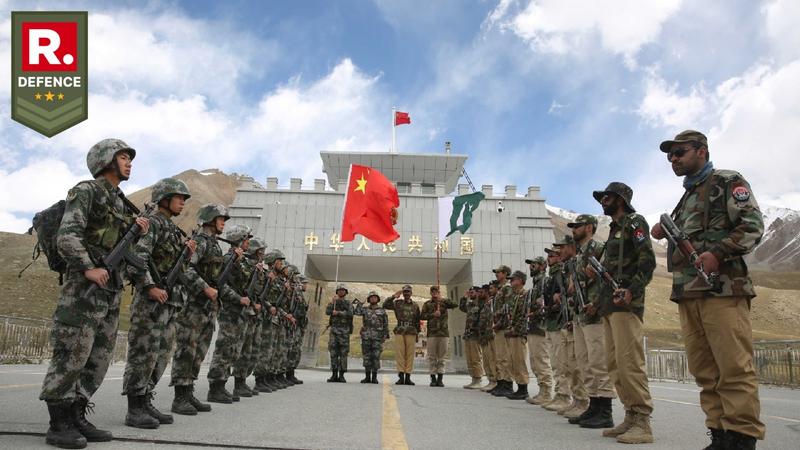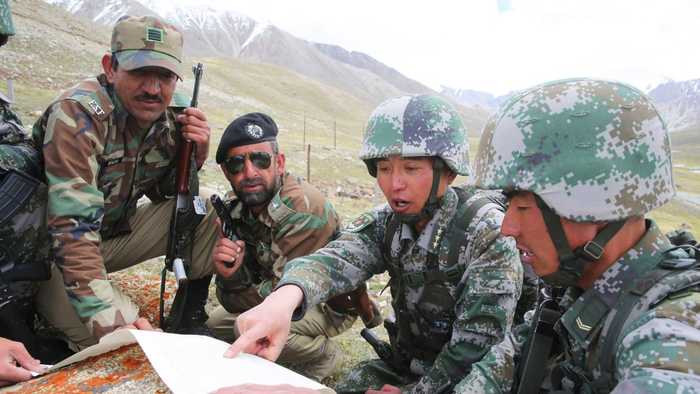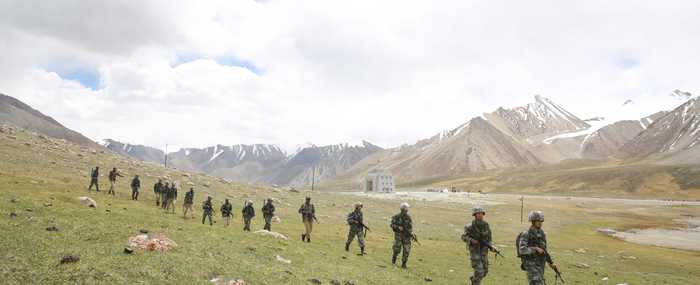Published 19:34 IST, November 20th 2024
Growing Sino-Pakistani Military Ties in 'Warrior-VIII' Exercises Spurs Security Concerns for India
This growing military collaboration has significant implications for India, particularly regarding security concerns along its borders with Pakistan.

New Delhi, India – The latest batch of Chinese troops has arrived in Pakistan to participate in the "Warrior-VIII" joint anti-terrorism exercise, signalling the strengthening of military ties between the two countries. The exercise, which commenced in late November and will run until mid-December, involves more than 300 Chinese soldiers, including specialists in special operations, army aviation, and logistics. The exercise is focused on counter-terrorism tactics, including joint clean-up and strike operations, with live drills designed to simulate real combat scenarios.
While military collaboration between China and Pakistan is not new, the timing of this exercise, coupled with the rising security concerns over the protection of Chinese investments in Pakistan, has significant regional implications—especially for India. The growing strategic partnership between China and Pakistan, particularly in the realm of defence and counter-terrorism, poses a direct challenge to India’s security interests in the region.
Beijing's Increasing Military Footprint in the Region
India has long been wary of the close military ties between China and Pakistan, given the implications this alliance has for regional stability. The "Warrior-VIII" exercise, which marks the eighth iteration of such drills, takes place at a time when both countries are facing significant internal security challenges. The primary focus of the exercise, counter-terrorism, comes in response to rising threats against Chinese nationals and investments in Pakistan, particularly in Balochistan.

The recent spate of attacks against Chinese workers in Pakistan, including the October bombing that killed two Chinese engineers, has prompted China to send its troops to bolster security for its workers and investment worth over US$ 65 billion. Beijing's increasing military footprint in the region, under the guise of safeguarding economic interests, raises questions about its broader geopolitical objectives. For India, the growing military cooperation between China and Pakistan further exacerbates security concerns along the Indo-Pakistani border, especially in areas like Jammu Kashmir and Punjab.
China's participation in anti-terrorism drills alongside Pakistan's military not only deepens the strategic alliance between the two countries but also strengthens Pakistan’s ability to challenge India's military supremacy in the region. The exercise is designed to bolster counter-insurgency operations, a capability that directly affects India’s security dynamics, particularly in Kashmir, where insurgent activities have been fueled by cross-border infiltration supported by elements within Pakistan.
China’s Increasing Role in Pakistan’s Internal Security: A Concern for India
The China-Pakistan Economic Corridor (CPEC), which aims to connect China’s Xinjiang region with Pakistan’s Gwadar Port, is a key component of the bilateral relationship. However, the growing Chinese involvement in Pakistan’s internal security and counter-terrorism efforts has not gone unnoticed by India. The "Warrior-VIII" exercise reflects Beijing’s increasing role in providing military assistance to Pakistan, raising concerns over the potential for enhanced Chinese influence in Pakistan’s strategic and security policies.
-1732111110275.webp)
Balochistan: A Flashpoint in Indo-Pakistani Relations
The security of Chinese investments, particularly in Balochistan, is one of the key drivers behind this joint exercise. Separatist movements in Balochistan, such as the Balochistan Liberation Army (BLA), have escalated their attacks on Chinese infrastructure and personnel. The Pakistani military’s heavy-handed response, combined with Chinese military support, could embolden Pakistan’s stance on Balochistan, a region where India has long advocated for greater autonomy and self-determination for its people.
-1732111028776.webp)
India has consistently voiced its concern over the human rights violations in Balochistan and has criticized China’s role in exploiting the region's resources through CPEC projects. The “Warrior-VIII” exercise is likely to further strain India’s relationship with both China and Pakistan, particularly as it provides Pakistan with additional military training and equipment under the watchful eye of the PLA.
Moreover, the increasing Chinese military presence in Balochistan poses a direct threat to India’s national security, as the region lies close to the disputed areas of Gilgit-Baltistan. With Pakistan’s military and Chinese forces jointly operating in the region, India faces growing challenges in asserting its claims in these areas.
Rising Terrorism and Proxy Warfare
The "Warrior-VIII" exercise takes place amid a wider regional surge in terrorism, particularly following the US withdrawal from Afghanistan in 2021. India’s concerns are compounded by the growing cross-border terror activities that have plagued its Jammu and Kashmir region. The exercise focuses on counter-terrorism operations, but India remains sceptical about the true intent behind these drills. While both China and Pakistan claim that the exercise is aimed at tackling terrorism, India views it as part of a broader geopolitical manoeuvre aimed at bolstering Pakistan’s military capabilities in its longstanding rivalry with India.

Furthermore, the exercise could provide Pakistan with advanced counter-insurgency techniques and intelligence sharing, which could be used against Indian forces operating along the Line of Control (LoC). Given Pakistan’s history of supporting terrorism in Kashmir, India is justifiably concerned that the training provided by China could enhance Pakistan’s ability to wage proxy warfare against India.
A New Strategic Threat for India
The growing military cooperation between China and Pakistan, exemplified by the "Warrior-VIII" exercise, is part of a broader trend of Sino-Pakistani strategic alignment that India cannot afford to ignore. With China becoming increasingly involved in Pakistan’s military and counter-terrorism efforts, India is facing a new strategic threat on its western border. The exercise is not just a military drill—it is a clear signal of China’s long-term ambitions to strengthen its influence in the region and challenge India’s regional dominance.
-1732111362955.webp)
India must also consider the broader implications of China's expanding military presence in South Asia, particularly its increasing support for Pakistan’s military operations in disputed regions like Jammu and Kashmir, Balochistan, and Gilgit-Baltistan. The strategic partnership between China and Pakistan has the potential to shift the balance of power in the region, with India caught in the crossfire of a growing Sino-Pakistani axis.
The "Warrior-VIII" exercise highlights the growing military collaboration between China and Pakistan, with significant security implications for India. As China deepens its involvement in Pakistan’s counter-terrorism operations, India is left to grapple with the increasing militarization of its Western neighbour, which threatens regional stability and India’s own security interests. The exercise further complicates the already delicate balance of power in South Asia, and India will need to adopt a more assertive diplomatic and military strategy to counter this growing alliance and safeguard its territorial integrity.
Updated 19:34 IST, November 20th 2024




